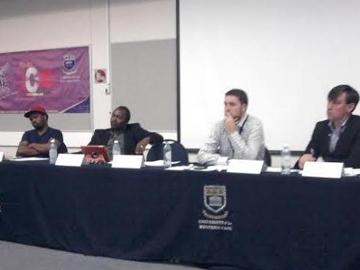NO ANC AT GAY RIGHTS DISCUSSION

Participants at the meeting. (Photo: Dumisani Dabadini)
Political parties participated in a discussion on Wednesday 23 April at the University of the Western Cape (UWC) about the lesbian, gay, bisexual, transgender and intersex (LGBTI) constituency after 20 years of democracy.
The event was hosted by various Western Cape civil society organisations. Neither the ANC nor the Freedom Front Plus sent representatives to the dialogue.
Keegan Matthyse from the UWC Gender Unit and Commission for Gender Equality asked the political parties if they acknowledge that there is a high rate of hate crime and how would they ensure that SA remains a safer place for the LGBTI community.
Representing the Economic Freedom Fighters(EFF), Andile Mngxitama, said his party acknowledged the high rate of hate crime in the country but the issue has to be to be dealt with on a broader scale. “South Africa is not safe. No one is safe unless society in general is safe,” said Mngxitama.
United Democratic Movement (UDM) representative, Mphuthumi Ntabeni, also acknowledged the high rate of hate crime in South Africa. The UDM, he explained, believes in re-educating communities in order for them to understand the rights of LGBTI. “The constitution is pointless when the people’s hearts are not with the Constitution. We encourage dialogue,” he said.
The Democratic Alliance (DA) representative, Jordan Hill-Lewis, also acknowledged the high rate of hate crime in the country. The DA believes that SAPS must play a major part in keeping the LGBTI community safe. Hill-Lewis also said, “We need to look at SAPS failures.” He pointed out the high rate of incompetence in SAPS which has also led to few convictions.
Francesco Uys Rootenberg from AGANG said a safer South Africa can be achieved by dealing with poverty and service delivery. “We have a constitution but it is not alive in our society. We need to encourage dialogue with the community in order to work towards a safer South Africa,” he said.
Douglas Newman-Valentine, from the UCT Division of Nursing and Midwifery, addressed the poor access to quality health care for the LGBTI community. “Medical students are not specifically trained to deal with LGBTI health issues,” he said. He asked the political parties what they would do to improve this. None of the parties appeared to have a specific point in their policies dealing with the specific health needs of the LGBTI constituency. Instead they referred to the human right to proper efficient health care to all.
Lucinda van der Heever from Sonke Gender Justice expressed concern about the anti-gay laws that have been passed in Nigeria and Uganda. Van der Heever pointed out that the South African government has been quiet about these oppressive laws and that this might be interpreted to mean that the country approves of them. She also pointed out the problem of LGBTI refugees being mistreated by Home Affairs because of their sexuality. She asked how the political parties would challenge countries that make laws that compromise the rights of the LGBTI community and what the parties are willing to do to ensure that LGBTI refugees are protected in SA.
The EFF’s Mngxitama said, “It is unAfrican to discriminate.” He pointed out that these discriminatory incidents mostly affect black people. Therefore we need to address the issue of race first.
The UDM’s Ntabeni suggested that the party would rather engage in a dialogue with the African leaders instead of taking an antagonistic approach. But, “Government has been very quiet about this issue” he said.
The DA’s Hill-Lewis said that his party issued a statement condemning the homopbobic laws. “We also organised a march in Pretoria to fight the passing of the anti-gay law in Uganda,” he said.
Funeka Soldaat an LGBTI rights activist with Free Gender said, “I don’t trust you guys. You are allowed to marry but I need a special act for me to be able to get married. We are not pushing for special treatment. We want human dignity.”
An audience member, Zuko Mnukwa, said he was happy with the dialogue but feels more time could have been allocated for the audience to participate. “I don’t trust the political parties to do anything for the LGBTI community while they fail to deliver basic services,” he said.
Source: GroundUp
Thank you for sending us this update. I am sorry I could not attend.